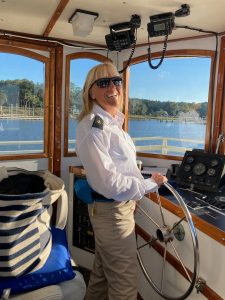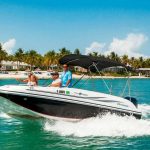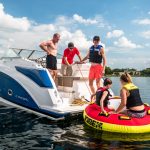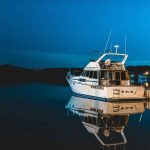Practice Safe Boating or Don't Boat

The US Coast Guard recommends that all boaters participate in safe boating instruction BEFORE they ever launch their boat. Check out the statistics below and you will understand why.
Boating Statistics
- Last year there were 4,439 reported boating accidents.
- These recreational boating accidents resulted in $67.5 million dollars in property damage.
- Of the reported accidents, there were 658 fatalities.
- Of the fatal boating accidents, 75% of the deaths occurred on boats where the operator had had no boating safety instruction.
- Only 16% of boating fatalities occurred on boats where the operator had received boating safety instruction.
These facts show that there is a vital need for on-the-water training (preferably on your own boat) that emphasizes safe boating practices.
If you are considering buying or upgrading to a new boat, find out if the organization you are dealing with supports safe-boating practices. Some of these safe-boating advocates are listed below.
Many marine dealers and marine manufacturers (like the ones listed here) actively support boating safety. Some of them even partner with safe-boating instructors. Ask them to refer you to qualified boating instructors or click here.
Your Boating Experience is just beginning when you Purchase a Boat.
Avoid being a statistic.
Learn the skills required for safely operating your boat
Criteria for Evaluating Training Excellence
Your answers to the questions below should help you evaluate the training being offered.
- Is the course content divided into specific training sessions with well-defined goals and objectives?
- Is the description of course content (of each training session) adequate to determine measurable results?
- Does the course developer declare that the course(s) align with the Coast Guard safety boating standards?
- Does the training include instructor credentials?
- Does the course description include information about the training procedures – student/instructor ratio, student/instructor interaction, training venue and duration?
- Does at least one or more of the training sessions address boat maintenance procedures, types of safety equipment, and boat-specific safety protocols?
- Does the course and the entirety of each session teach skills consistent with those advocated by the Coast Guard?
- Does one or more of the sessions teach the standard skills that entry-level boat operators should be able to perform.
- Does one or more of the sessions teach the advanced skills that experienced boat operators should be able to perform.
- Do the majority of the sessions take place primarily on the water using hands-on learning?
- Do the students spend most of their training time on their own boat, practicing hands-on learning on the water?
- Do all of the sessions involve instructors working directly with students as opposed to class-room or internet training?
- Are the instructors present with students as the students learn to operate their own boat?
- Do the course sessions thoroughly cover what you need to do (boat operation) AND what you need know (navigation rules) in order to operate a recreational boat safely?
Sea Island Boating Instructor's Guarantee
TRAINING EXCELLENCE
As you consider taking a boating instruction course, please note that the training offered by the Sea Island Boating Instructors is unique and highly respected for the following reasons:
- Hands-on training,
- Conducted on the owner’s boat (if available),
- Taught by licensed captains with years of experience
- Based on a selection of comprehensive training modules which emphasize safe boating practices
- Includes modules designed for new boat owners and modules designed for experienced boaters who might be graduating up to a new, bigger, or more powerful boat.
CUSTOMER SASTISFACTION
After you’ve been trained by Sea Island Boating Instructors, you will be ready to fully enjoy your time on the water – whether it be cruising to Savannah, island hopping between Georgia’s Barrier Islands (Jekyll, St. Simons, Sea and Tybee) or just plain relaxing on local waters with family and friends.
US Coast Guard sAFETY rEQUIREMENTS
Training from the Sea Island Boating Instructors covers most topics of importance to recreational boaters. For example, the training includes the following US Coast Guard safety requirements. In their Rules and Regulations module, you will learn what items are required for you depending on the size of your boat.
Life Jackets
One (1) USCG Approved Type I, Type II, Type III, or Type V PFDs per person on board. A few of our favorites to meet this requirement:
- The Kent 4-pack of Type II Vests is a great way to meet requirements should you invite guests on board or need extra life jackets for any reason. We also like to carry these in the dinghy to meet requirements.
- Onyx Automatic/Manual Inflatable Life Jackets in blue, green or pink
Throwable Devices
One (1) USCG approved Type IV throwable on board. The Taylor Made Foam Ring Buoys (they come in sizes 20″, 24″ and 30″ along with parts to mount them), horseshoes or throwable cushions are great options to meet this USCG requirement.
Fire Extinguishers
One B-II and one B-1 extinguisher or three B-1 extinguishers. Check your extinguishers regularly as they can leak or fail over time.
Visual Distress Devices
With wide adaptation of LED technology, electronic flares / electric SOS signal lights are an easy and reasonable alternative to traditional flares. The USCG approved ACR ResQFlare Electronic Flare is a great example and comes with the orange distress flag. To be USCG compliant you must have an orange distress flag for daytime signaling and the LED signal must be USCG approved. These are safer as there is no fire and will signal longer than traditional flares.
Pyrotechnic Flares – three (3) day use and three (3) night use or three day / night combination flares. Traditional flares have an expiration date and require special hazardous shipping making the modern LED Signal lights more practical.
Sound Producing Devices
A horn or whistle is suitable, but must be able to produce an efficient sound signal audible for 1/2 mile with a 4 to 6 second duration. Human Voice is not considered suitable
A horn or whistle that is able to produce an efficient sound signal audible for 1/2 mile with a 4 to 6 second duration is necessary. Human voice is not considered suitable. You may choose an electric or manual horn, both of which come in the portable and built-in variety. We recommend these portable sound producing devices:
For a variety of items to help you meet USCG requirements, see the New Boat Starter Kits collection, that are perfect for small, medium and large boats as defined by the US Coast Guard
Get in Touch with Sea Island Boating Instructors Today
Be trained for whatever adventure awaits you.

















